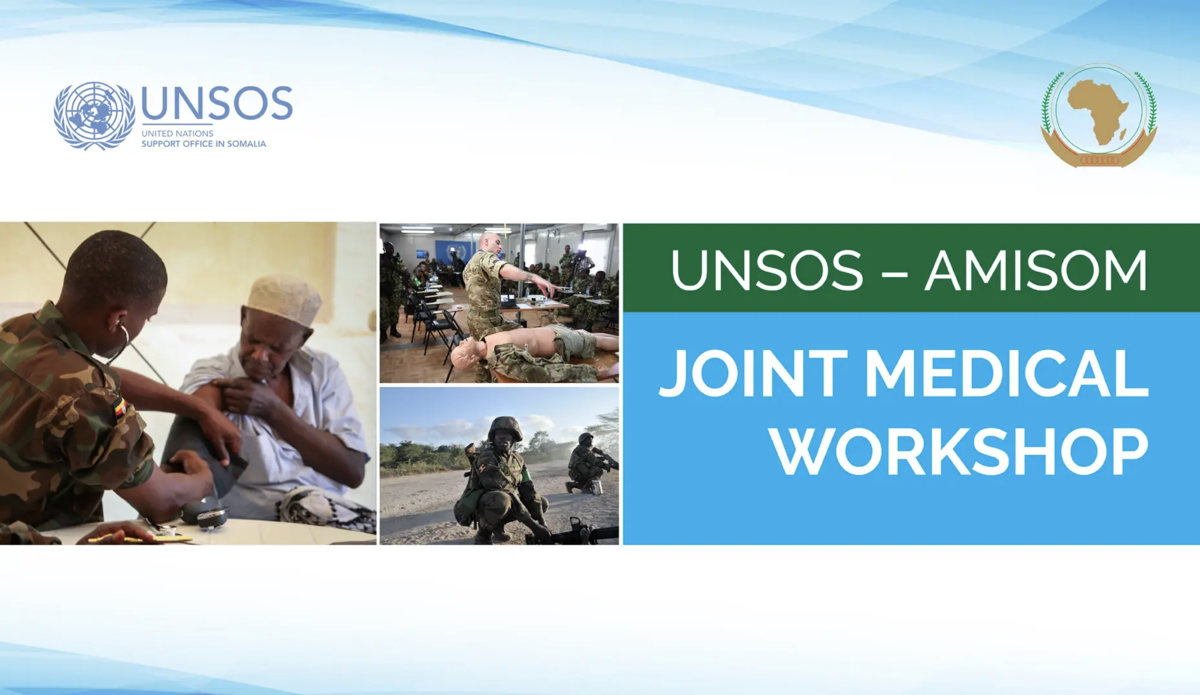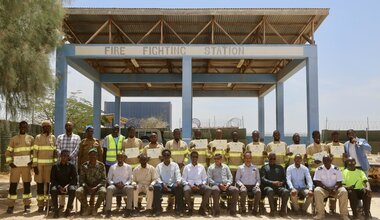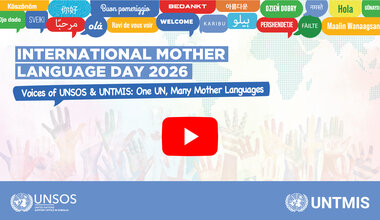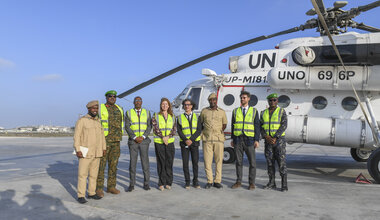UNSOS-AMISOM joint medical workshop on life-saving skills
Mogadishu - Thirty-seven officers serving under the African Union Mission in Somalia (AMISOM) completed a three-day medical workshop to develop their capacity in the battlefield.
The workshop, organized by the United Nations Support Office in Somalia (UNSOS) and facilitated by the UK70 training team, was attended by officers from the military and police components from all the AMISOM sectors in Somalia. Besides battlefield life-saving skills, the participants were also taken through medical logistics, pre-evacuation drill and prevention of diseases in the sectors.
“This workshop provides you with an opportunity to get proper orientation of all types of casualties that you’re going to be dealing with during your tour of duty,” said AMISOM Force Commander, Lt. Gen. Jim Beesigye Owoyesigire speaking during the opening ceremony.
The Force Commander lauded UNSOS for its support to AMISOM, noting that the workshop had come at an appropriate time when the peacekeeping force had embarked on a transition plan to hand-over responsibilities to the Somali National Security Forces.
The UK70 Medical training team together with their AMISOM counterparts also trained the participants on how to evacuate servicemen injured on the battlefield expeditiously.
Presiding over the closing ceremony, AMISOM’s acting Head of Mission Support, Mathias Ngarambe, who was accompanied by the officer in charge of UNSOS medical section, Dr Papa Fall, asked the participants to use the skills gained during their tour of duty in the Mission area.
“I hope you have been acquainted with enough skills and knowledge on how the Mission is working and the challenges the Mission is facing and I hope with these skills you’ll be able to execute your duties during the period you’ll be in this Mission,” Mr. Ngarambe said.
In an interview, the AMISOM Force Medical Officer, Lt. Col. Boniface Mandishona, elaborated on the objective of the workshop, noting it was important for new medical staff members to familiarize themselves with the processes and procedures of looking after casualties in an environment where the use of Improvised Explosive Devices (IEDs) by the enemy was common.
“This mission is unique and because of that, we’ve come up with a package which is both theoretical and practical to try to acquaint them (new medical staff) with the different processes and procedures that we do as we look after our soldiers,” Lt. Col. Mandishona said.
Speaking after the training, two participants Staff Sergeant Ali Dekow from sector two in Dhobley and Lt. Mary Sylvia Lamunu who heads Level Two hospital in sector one, praised the training for equipping them with new skills on how to handle servicemen injured on the battlefield.
“We were taught how to manage our patients in the first 10 minutes to reduce deaths that occur in the first 10 minutes so that they can be moved to hospital and treated to help them survive the impact of the IEDs,” Sergeant Dekow said.
The UK70 training coordinator Sergeant Kyle Williams said the main focus for the workshop was the training of trainers who can go back to their respective sectors and share the skills acquired with their colleagues.
“What we are really focusing on is the training of trainers’ course and our emphasis is to get to sectors, get the guys who are not in the main UN locations and FOB locations get them back into the sector operations to deliver that training of trainers to them and they can return back to the sectors and deliver that basic casualty drills, life-saving training to their own troops and also to the Somali National security forces which obviously will help with the transition plan as well,” Sergeant Williams added.
The workshop was attended by medical officers who included nurses, pharmacists and clinical officers among others.
 UN
UN





